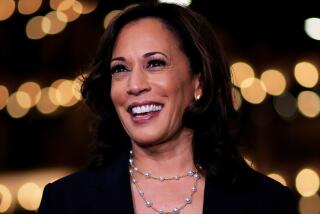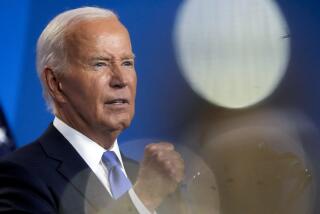Simon Foresees a Role as Broker at Convention
- Share via
WASHINGTON — Illinois Sen. Paul Simon said Wednesday he is now convinced the Democratic nominating convention will be brokered and because of this, he will in effect begin his presidential campaign anew in Illinois on March 15 so that he can be one of the brokers.
His decision to keep going despite finishing fourth in both Minnesota and South Dakota on Tuesday underscored how muddled the still-crowded Democratic presidential race is.
Although many political professionals question the wisdom of Simon’s decision to remain in the race, he may prove correct in predicting that there will still be no clear front-runner after Super Tuesday, March 8.
He is probably also correct in saying that after that 20-state contest, most if not all of the other Democrats will have financial resources almost as limited as his.
Limits Plans for South
Simon said at a press conference here that he would not campaign much in the South for Super Tuesday votes but would concentrate instead on such states as Illinois, Ohio, Wisconsin and Michigan, which vote in the period after Super Tuesday.
“I will participate in debates that are nationally televised,” Simon said, “But we do not have the resources for winning” in Southern states.
“The campaign will begin anew after Super Tuesday, starting in Illinois,” he said.
Simon said he expects to win in his home state, which will elect 187 delegates, but acknowledged that if he did not “I would have to reappraise things.”
“My reason for getting into the race,” Simon said, “was that I sensed a void. We needed a candidate . . . who was committed to using the tools of government to resolve our social problems. . . . That’s what keeps me in the race.”
Since 1976, noted Simon campaign director Brian Lunde, one or two candidates have been expected to emerge after the early contests.
‘Reverse of 1976’
“That is not the case this year,” Lunde said. “This year will be the reverse of 1976, I think. The candidate who finishes strongly this time goes into the convention in the best position. In 1976, Jimmy Carter started strong and then limped across the finish line.”
But Simon’s problem is that in a media-driven contest he is still in danger of being seen as an also-ran, because he has not won a contest while Dukakis and Gephardt have won two each.
A recent national New York Times-CBS News Poll found that the public now views Dukakis and Gephardt as the front-runners in the Democratic race.
“But I am an also-ran who after the four states that have voted so far has moved into number two in delegates,” Simon argued Wednesday.
Simon’s delegate count was evidently based on an assumption that he will receive a significant share of Minnesota’s 86 delegates as a result of his 18% share of the non-binding straw vote taken at Tuesday’s caucuses, and that Gephardt, who got just 8% of the Minnesota straw vote, will not. The Minnesota delegates will not actually be chosen for several weeks, however.
33 Delegates in AP Tally
According to the Associated Press’ count of delegates to date, which does not reflect the Minnesota results, Simon is running third with 33 delegates, behind Dukakis with 44 1/2 and Gephardt with 39.
Simon appears to be determined to be a broker, if not a serious candidate, at the Democratic convention in Atlanta in July. For him, it is a last-ditch battle to keep the party from moving away from some of its longtime ideals, including fighting for the disadvantaged and spending money for social programs.
“I want the message I stand for to be loud and clear,” Simon said.
“You will have people at the convention who have the power (of brokers), such as labor. The NEA says it will have 200 to 300 delegates there. I assume they would be very interested in a candidate who stands foursquare on the issue of education. We’re going to have a very interesting convention, and I intend to win.”
Simon’s decision to fight on has divided his top advisers, some of whom feel that he is in danger of embarrassing himself and of hurting his chances of reelection to the Senate in 1990.
Contributions Pick Up
The campaign has had many late-night discussions, but one thing that has kept Simon going is that campaign contributions have actually picked up since he finished second in Iowa and third in New Hampshire.
That was not supposed to happen, but Simon said all he can figure is that many old-fashioned liberals are not ready to cede the Democratic fight to Dukakis, whom they see as a technocrat, and Gephardt, who has cast some conservative votes in Congress since 1981.
“We took in $137,000 on Monday,” Simon said. “We have never had a fund-raising day like that in the entire campaign.”
More to Read
Get the L.A. Times Politics newsletter
Deeply reported insights into legislation, politics and policy from Sacramento, Washington and beyond. In your inbox twice per week.
You may occasionally receive promotional content from the Los Angeles Times.










